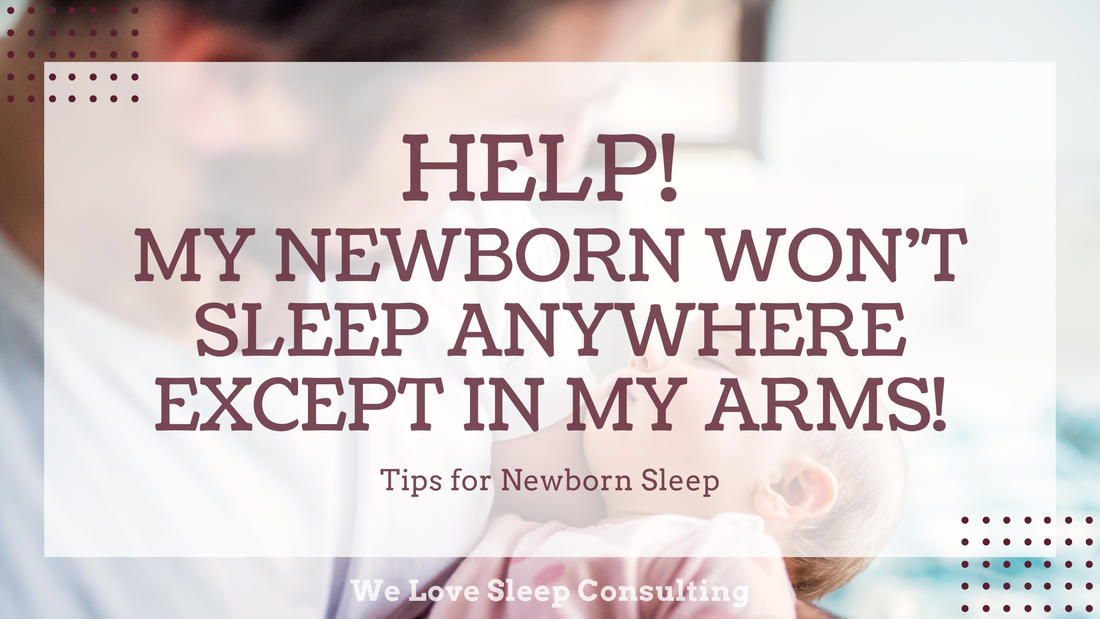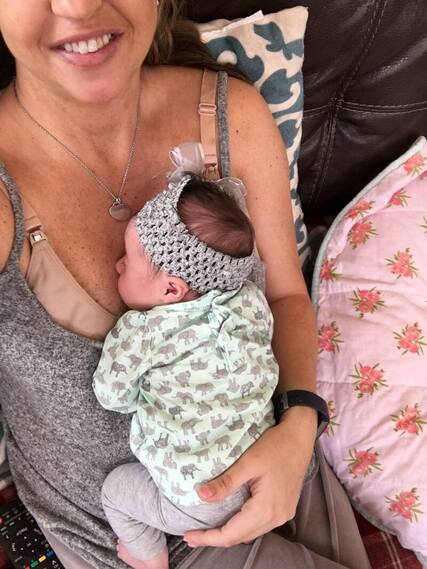|
Anyone who's had a new baby knows there are days when your baby doesn't want to be put down even for a second, and it's hard to get anything done. And when I had new babies, I remember those sweet, cuddly moments with my newborn napping in my arms or on my chest were some of my FAVORITE moments that I still cherish. I loved those precious times. But every parent knows you can't survive that way 24 hours a day for months.
It is dangerous for parents to fall asleep with their babies in their arms, and it's also dangerous for parents to try and stay awake constantly and not get any sleep at all. So while those snuggly naps are sweet, you also need to be able to help your new baby sleep on their own as well. For some babies, it's easy, but for others, it can seem almost impossible. WHY DO NEWBORNS LOVE BEING HELD? It has been referred to as The Fourth Trimester, and it's the time right after a baby is born when they're adjusting to being outside the womb, and the baby craves the closeness and coziness of the womb. It's very natural for new babies to want to be held while sleeping. Here are some ways you can help your baby feel cozy and get good naps, while also keeping your baby safe: 1. Use a baby carrier. A good baby carrier can be a lifesaver for days when your baby doesn't want to be put down, but you have things to do (or other kids to take care of). A comfy, stretchy carrier, such as a K'Tan is good, and I loved using my LilleBaby carrier. If the baby is properly secured in the carrier and the person wearing it is safe, it's safe for babies to nap in baby carriers. 2. A stroller or car seat nap. It is safe for your baby to sleep in the car seat ONLY if properly installed in a car or stroller using the base, and if the baby is properly strapped in. It is not safe to bring the infant carrier out of the car and allow your baby to sleep in it while it's sitting on the ground (this is a suffocation risk). But sometimes when your baby won't let you set them down and they need a nap and you need a break, a safe car seat nap or stroller nap can help! 3. Call a friend. Let someone come get their baby fix and hold your baby for a nap so you can go take a nap (or a shower!). SAFE SLEEP FOR NEWBORNS Keep in mind, the safest place for a newborn to sleep is ALONE, on their BACK, and in a CRIB (or safe sleeping surface such as a basinet). Swings, or any inclined sleeping surface are not safe for sleep, and baby sleep positioners, such as Dock-a-Tot or SnuggleMe's are also not safe for sleep. Keeping your baby safe is the top priority. Here are 6 tips to help your newborn sleep independently. 1. Start as you mean to go on. If you always feed to sleep, hold to sleep, or rock to sleep, that's the only way your baby will know how to get to sleep. I started with both of my babies from literally day one, allowing them to go to sleep on their own, in their own crib, in their own room (my second had to share a room with me in the beginning, due to space restrictions, but I moved her basinet as far away from my bed as I could). They didn't get used to being nursed or rocked to sleep for every single sleep. Start from the beginning with the sleep habits you want your baby to have in the future. 2. Practice independent sleep every day. Even if you DO hold your newborn baby for a few naps a day, and I encourage you to do it - soak up those snuggles! - I also encourage new parents to attempt independent sleep at nighttime and for at LEAST one nap a day. There are lots of opportunities to practice, because newborns sleep often! So if you attempt it for one nap, and it doesn't happen, it's ok! Try it again for the next nap. 3. Lay your baby down drowsy and awake. Instead of rocking your baby to sleep and then placing them down in their bed asleep, which will often lead to wake-ups, lay them down awake and allow them to go to sleep on their own. If they cry, try to offer comfort without picking your baby up first, and if needed, pick up and comfort and then lay your baby down again. It's ok to allow your baby to wiggle and grunt or even fuss a bit if you're comfortable with it. You don't have to let your newborn cry though. You can offer help and give comfort without actually rocking your baby completely to sleep. 4. Pay close attention to wake windows. A common reason babies have a hard time getting themselves to sleep is when they are put down either overtired or under-tired. Pay close attention to your baby's wake windows and lay the baby down in their "sweet spot" which will give them the most chance of successfully going to sleep independently without crying. If your baby is already yawning and fussing from being tired, the baby is overtired. Lay your baby down before the baby starts showing those late sleepy cues. 5. Keep your baby swaddled for sleep. Babies sleep best when they are swaddled in a good, tight, cozy swaddle. If you're not gifted at the skill of swaddling using a blanket, there are great options for velcro swaddles or zip-up swaddles. Also, a white noise machine with constant white noise will help your baby sleep. 6. A consistent routine. Babies LOVE routines. Even if you're not on a strict by-the-clock schedule, you can keep your baby on a solid eat/wake/sleep routine to make sure they get full feedings and adequate awake time during the day (you don't need to have awake time after feedings at night). You can start a simple pre-nap and pre-bed routine even for newborns, which will signal to their bodies that it's time for sleep. The routine could be as simple as a quick song or a cuddle, diaper change, swaddle on, lights off, sound machine on, and laying the baby down to go to bed. When you lay your baby down for sleep, make sure your baby:
If you do all of these things, and your baby is just not having it, try the Pick Up/Put Down technique:
Or try the Shush/Pat technique:
Soak up those newborn baby snuggles, because the newborn days go by so quickly, and once your baby can run around, you will miss the sweet cuddly naps in your arms. It's ok to be exhausted and need a break. It's ok to help your baby learn to sleep independently so you can get enough sleep to safely function and care for them. As difficult as the newborn days can be, remember, they won't last forever. If your baby is already in the habit of being held for sleep and you are ready to sleep train, you can reach out to me and I would love to help walk you through the process of teaching your baby independent sleep! This post just an excerpt of my comprehensive NEWBORN GUIDE, which is a must-have for new parents and teaches all the secrets of how I got both of my babies to sleep 12 hours straight all on their own before 12 weeks old. Share this post with a new or expectant mom, and share in the comments if your babies loved being held for naps when they were newborns.
4 Comments
9/17/2021 01:36:00 pm
It's great that you mentioned that a consistent routine will help a baby sleep better. My sister's baby has been having a lot of sleepless nights lately. It might be a good idea for my sister to find a sleep consultant that can help her with her baby.
Reply
Diane
9/8/2022 01:35:27 pm
My 8 week old does not sleep unless she in on my chest or in my arms, or in my fiancés arms. Even at night. She hated her bassinet when we did try to sleep train her the first two weeks and I’ve only gotten her to stay in her baby swing for 30-60 mins probably about 4 times since birth. She falls asleep in the car when driving but otherwise it’s very difficult. What can we do? Also how can we start to train her to sleep longer through the night?
Reply
Netta
3/7/2023 01:59:16 pm
I am currently going through that right now with my 4 week old.
Reply
My baby was having troubles staying asleep since birth.
Reply
Leave a Reply. |
Lynne HowardPediatric Sleep Consultant Archives
June 2023
Categories |



 RSS Feed
RSS Feed
